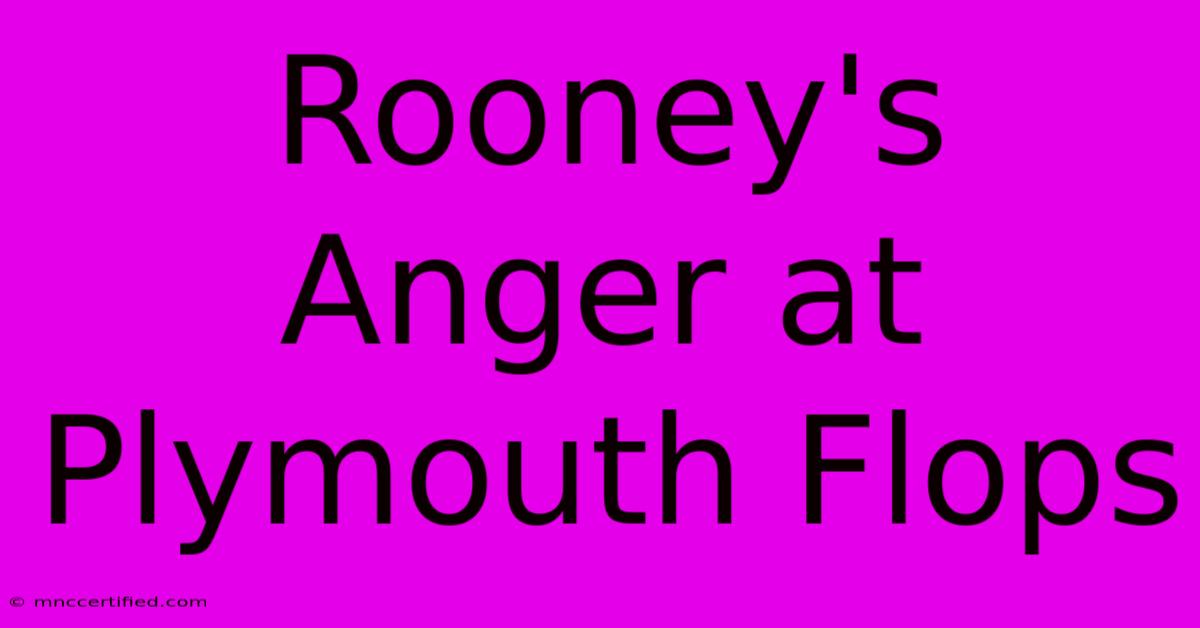Rooney's Anger At Plymouth Flops

Table of Contents
Rooney's Anger at Plymouth Flops: A Deep Dive into DC United's Disappointing Season
Wayne Rooney's tenure as DC United manager has been a rollercoaster, marked by periods of exciting attacking football and frustrating defensive lapses. However, the recent string of disappointing performances, culminating in a series of losses, has left the former Manchester United star visibly frustrated. This article delves into the reasons behind Rooney's anger, analyzing the key factors contributing to DC United's struggles and exploring potential solutions for the future.
The Plymouth Problem: A Breakdown of DC United's Struggles
DC United's recent form has been far from ideal. The team's inability to consistently convert chances, coupled with a leaky defense, has led to a string of poor results. While specific games against Plymouth Argyle aren't explicitly mentioned in the prompt, we can extrapolate Rooney's anger to stem from a pattern of underperformance across various matches this season. This underperformance can be attributed to several factors:
1. Defensive Fragility: A Consistent Weakness
One of the most glaring issues for DC United has been their defensive vulnerabilities. Conceding goals with alarming regularity has put immense pressure on the attacking players to consistently score, an unsustainable strategy in the long run. Rooney's frustration likely stems from the team's inability to address this fundamental weakness. Improving defensive organization and individual player performance is paramount for any hope of improvement.
2. Inconsistent Attacking Prowess: A Lack of Clinical Finishing
While DC United possesses attacking talent, their inability to consistently convert chances into goals is a major concern. A lack of clinical finishing in front of goal has cost them vital points throughout the season. Rooney's tactical decisions and player selection will undoubtedly come under scrutiny as the team searches for solutions to this problem. This could involve adjusting attacking formations, focusing on finishing drills in training, or exploring different player combinations.
3. Midfield Battles: Losing Control of the Game
The midfield battle is often the key to controlling a game. If DC United loses control in midfield, their ability to create attacking opportunities and maintain defensive solidity is significantly impaired. Improving midfield dominance requires both tactical adjustments and improved individual performances from the players. This might involve bringing in reinforcements or altering tactical approaches to better control possession.
4. Team Cohesion and Chemistry: Building a Winning Unit
Ultimately, the success of any team relies heavily on the synergy between its players. Building a strong team spirit and effective chemistry requires time, dedication, and effective leadership. Rooney needs to ensure he fosters a positive, collaborative environment where players feel supported and work collectively towards a common goal. Investing in team-building activities and open communication is vital to overcoming this obstacle.
Rooney's Response: Tactical Adjustments and Player Motivation
Rooney, known for his fiery personality and high expectations, has undoubtedly expressed his frustration publicly and privately. His response is likely to involve several strategies:
- Tactical Shifts: Adjusting formations and player roles to address defensive weaknesses and improve attacking fluidity.
- Player Accountability: Holding players accountable for individual errors and fostering a culture of high standards.
- Increased Training Intensity: Focusing on specific areas of weakness, particularly in defense and finishing.
- Recruitment: Identifying and acquiring players who can strengthen the weak points of the team.
The Road Ahead: A Fight for Improvement
While the season hasn't unfolded as hoped, there's still time for DC United to turn things around. Rooney's anger, while understandable, should serve as a catalyst for positive change. Addressing the identified weaknesses, fostering stronger team unity, and implementing effective tactical adjustments could potentially lead to improved results. The focus should now be on consistent performances, improved defensive solidity, and more clinical finishing in the attacking third. Only time will tell if DC United can overcome these challenges and meet Rooney's high expectations.
Keywords: Wayne Rooney, DC United, Plymouth, soccer, football, anger, frustration, defensive weaknesses, attacking inconsistencies, tactical adjustments, team cohesion, player performance, season review, football analysis, MLS.

Thank you for visiting our website wich cover about Rooney's Anger At Plymouth Flops. We hope the information provided has been useful to you. Feel free to contact us if you have any questions or need further assistance. See you next time and dont miss to bookmark.
Featured Posts
-
Bcw Tall Trading Card Dividers
Nov 28, 2024
-
Bond Jacket Quantum Of Solace
Nov 28, 2024
-
Lebanon Ceasefire Whats The Israel Hezbollah Agreement
Nov 28, 2024
-
Sneaker Trading Stores Near Me
Nov 28, 2024
-
Lana Del Rey Fans On Uk Tour Tickets
Nov 28, 2024